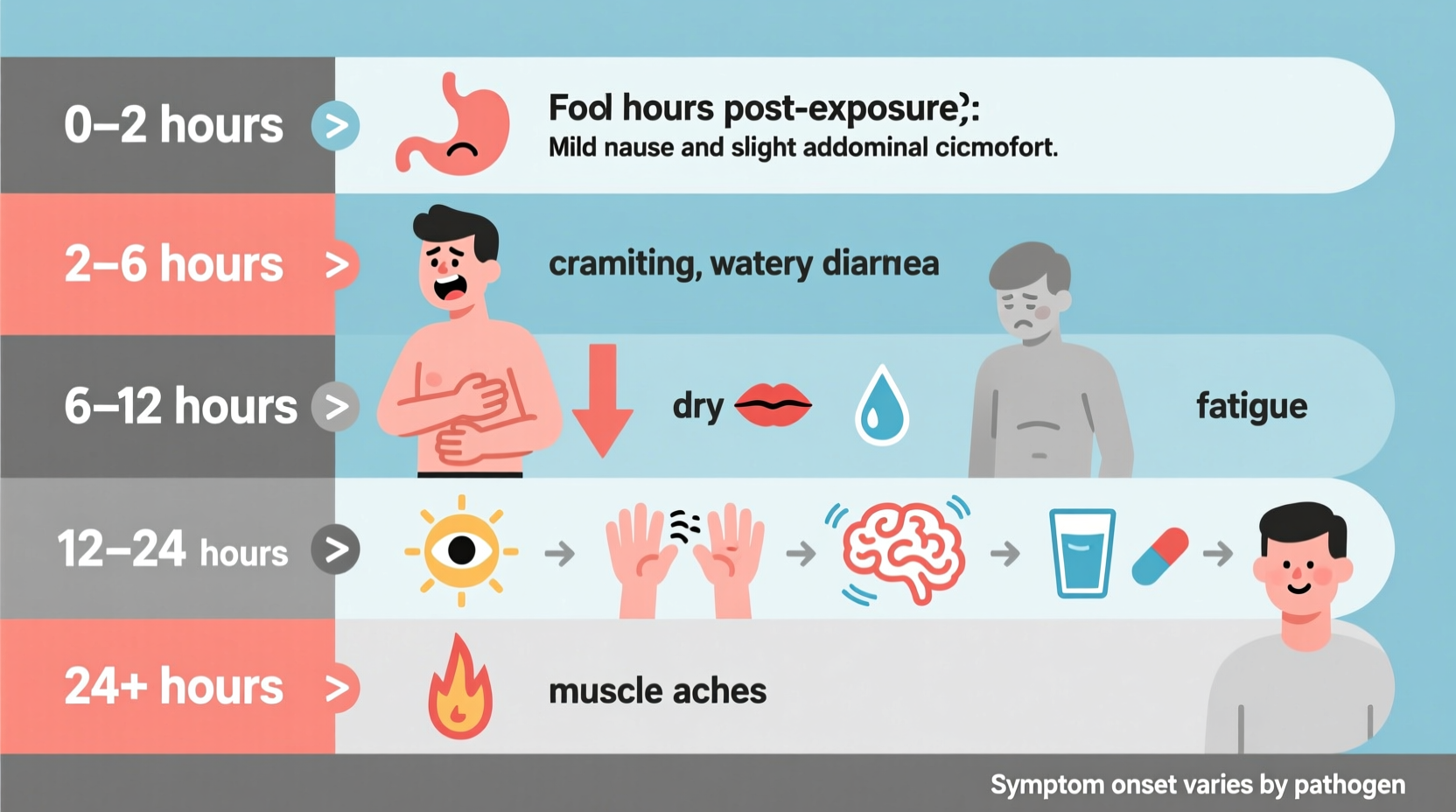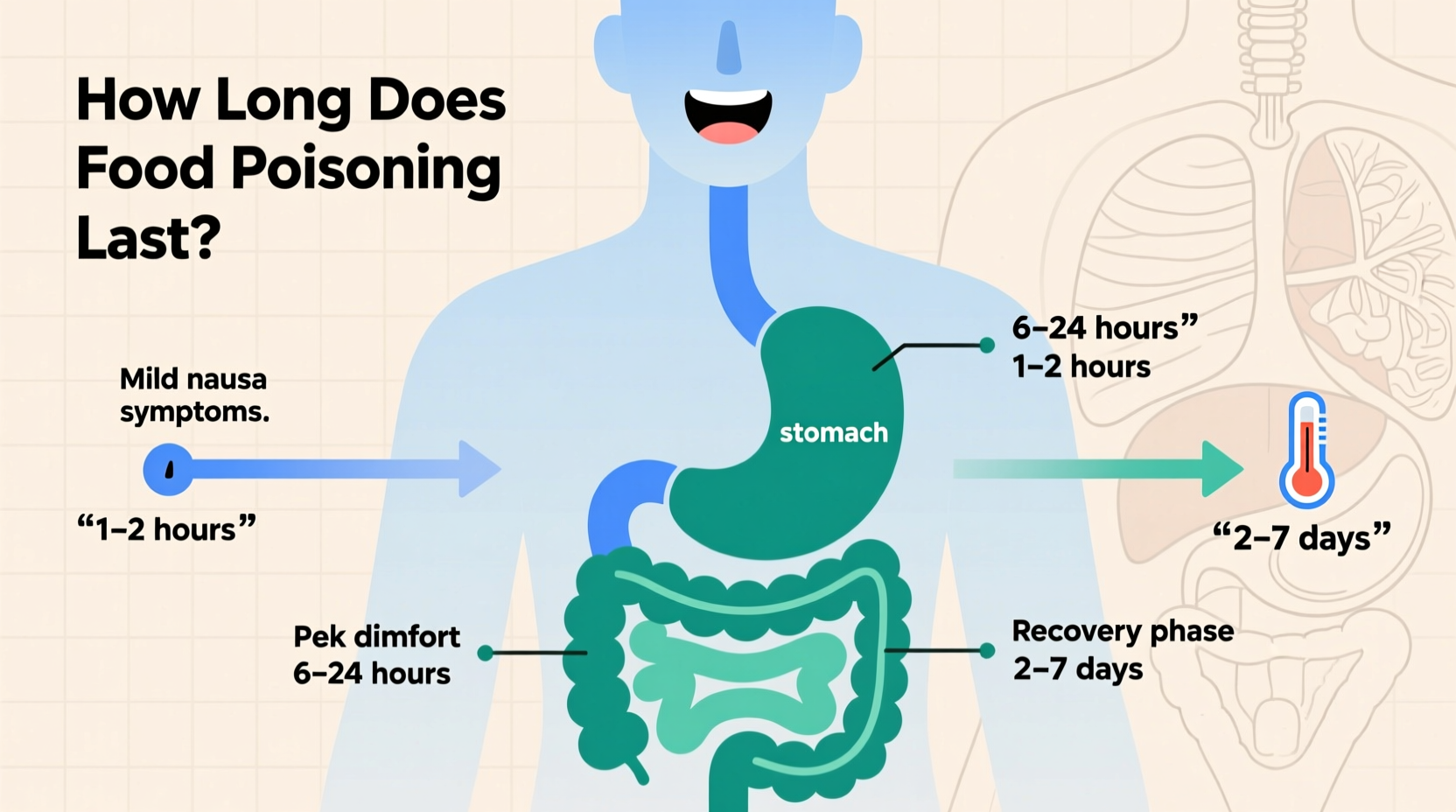When food poisoning strikes, one of the first questions that crosses your mind is likely: "How long will this last?" Understanding the typical timeline of foodborne illness can help you manage symptoms, know when to seek medical care, and prevent complications. This comprehensive guide breaks down food poisoning duration based on scientific evidence from medical authorities.
What Determines Food Poisoning Duration?
Your recovery timeline depends on several key factors that interact in complex ways. Knowing these variables helps explain why two people eating the same contaminated meal might experience vastly different illness durations.
Pathogen Type: The Primary Determinant
Different bacteria, viruses, and parasites cause food poisoning with distinct timelines. The specific microorganism responsible for your illness is the single biggest factor determining how long symptoms will last.
| Pathogen | Incubation Period | Typical Duration | Common Sources |
|---|---|---|---|
| Norovirus | 12-48 hours | 1-3 days | Raw shellfish, contaminated surfaces |
| Salmonella | 6-72 hours | 4-7 days | Raw eggs, poultry, unpasteurized milk |
| E. coli | 1-10 days | 5-10 days | Undercooked beef, raw produce |
| Rotavirus | 1-3 days | 3-8 days | Contaminated water, person-to-person |
| Campylobacter | 2-5 days | 2-10 days | Raw poultry, unpasteurized dairy |
| Listeria | 1-4 weeks | Days to weeks | Ready-to-eat meats, soft cheeses |
This comparison of food poisoning duration by pathogen comes from the Centers for Disease Control and Prevention's comprehensive foodborne illness guide, which tracks outbreak data from thousands of cases annually.
Individual Health Factors That Affect Recovery Time
Beyond the pathogen itself, your personal health profile significantly influences how long food poisoning symptoms persist:
- Immune system strength - People with compromised immunity often experience longer illness durations
- Age - Infants and elderly adults typically have more prolonged symptoms
- Hydration status - Dehydration can extend recovery time by weakening your body's defenses
- Pre-existing conditions - Digestive disorders or chronic illnesses may complicate recovery
- Treatment timing - Early intervention with proper care can shorten duration
Day-by-Day Food Poisoning Timeline
Understanding what to expect during each phase of food poisoning helps you track your recovery and recognize warning signs:
Days 1-2: Acute Symptom Phase
Most people experience the most intense symptoms during the first 48 hours after symptoms begin. This typically includes:
- Nausea and vomiting (peaking around 24 hours)
- Watery diarrhea (most frequent in first 36 hours)
- Abdominal cramps and pain
- Low-grade fever (in bacterial cases)
Days 3-5: Recovery Phase
For most common foodborne illnesses, symptoms begin to subside during this period:
- Vomiting typically stops by day 3
- Diarrhea frequency decreases significantly
- Energy levels gradually improve
- Diet can slowly expand from BRAT (bananas, rice, applesauce, toast) to more substantial foods
Days 6-10: Complete Recovery
By this stage, most people have returned to normal activities, though some may experience:
- Occasional loose stools
- Mild digestive sensitivity
- Residual fatigue

When Food Poisoning Lasts Longer Than Expected
While most cases resolve within a few days, certain situations indicate you should seek medical attention:
Warning Signs Requiring Immediate Care
Contact a healthcare provider if you experience any of these red flags:
- Symptoms lasting longer than 3 days without improvement
- Signs of severe dehydration (dark urine, dizziness, dry mouth)
- Blood in vomit or stool
- High fever (over 101.5°F or 38.6°C)
- Inability to keep liquids down for 24 hours
- Numbness or tingling (possible botulism)
According to the FDA Food Code guidelines, certain pathogens require specific medical interventions that can significantly reduce illness duration when administered promptly.
Practical Steps to Shorten Your Recovery Time
While you can't instantly cure food poisoning, these evidence-based strategies can help you recover faster:
Hydration: The Most Critical Factor
Maintaining fluid balance is the single most important action you can take:
- Sip small amounts of oral rehydration solutions frequently
- Avoid sugary drinks and caffeine which can worsen dehydration
- Include electrolytes to replace what's lost through vomiting and diarrhea
Dietary Management During Recovery
Your food choices directly impact how quickly your digestive system recovers:
- Start with clear liquids, then progress to bland foods
- Avoid dairy, fatty foods, and spicy dishes until fully recovered
- Gradually reintroduce fiber as symptoms improve
- Consider probiotics to restore healthy gut bacteria
When Medication Can Help (and When It Can't)
Not all medications are appropriate for food poisoning:
- Anti-nausea medications may be prescribed in severe cases
- Antibiotics are only effective for specific bacterial infections
- Anti-diarrheal medications can be counterproductive for certain pathogens
- Never take medication without consulting a healthcare provider
Preventing Future Episodes: Reducing Your Risk
Understanding how long food poisoning lasts is important, but preventing it altogether is even better. The CDC's food safety guidelines highlight these critical prevention strategies:
- Proper handwashing before handling food
- Cooking meats to appropriate internal temperatures
- Preventing cross-contamination between raw and ready-to-eat foods
- Refrigerating perishable foods within two hours (one hour in hot weather)
- Washing fruits and vegetables thoroughly
Special Considerations for Vulnerable Populations
Certain groups require extra caution due to potentially longer or more severe illness:
- Pregnant women - Listeria can cause prolonged illness with serious complications
- Young children - Dehydration develops more quickly, extending recovery time
- Older adults - Weakened immune systems often lead to longer symptom duration
- Immunocompromised individuals - May experience food poisoning symptoms for weeks
For these groups, even mild food poisoning symptoms warrant earlier medical consultation to prevent complications that could significantly extend illness duration.
When to Return to Normal Activities
Knowing when you're truly recovered affects not just your health but also preventing transmission to others:
- Wait at least 48 hours after symptoms end before preparing food for others
- Continue practicing strict hand hygiene for several days after recovery
- Gradually resume normal activities as energy returns
- Listen to your body - pushing too soon can prolong recovery
Following these guidelines helps ensure your food poisoning episode doesn't last longer than necessary and prevents spreading illness to others.











 浙公网安备
33010002000092号
浙公网安备
33010002000092号 浙B2-20120091-4
浙B2-20120091-4